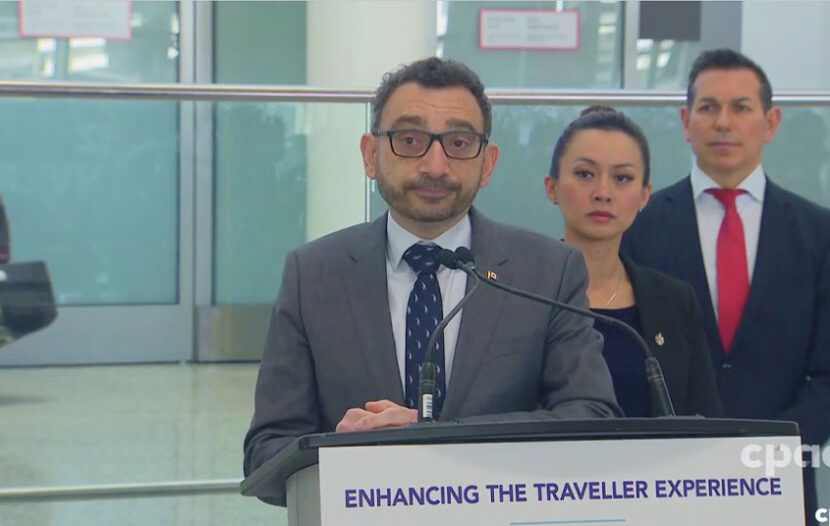TORONTO — 42,000. That’s how many passenger rights complaints are currently in the queue to be processed by the Canadian Transportation Agency (CTA).
But newly announced government funding to the tune of $75.9 million over three years starting in 2023-24 will make it possible for the agency to hire more employees and make a significant dent in the processing of these complaints.
“We all know that the COVID-19 pandemic has caused massive disruptions to the airline sector that contributed to challenges we saw last summer and over the holiday season. Those challenges have been particularly difficult for travellers and the industry as a whole. Travellers have experienced unacceptable delays, flight cancellations, lost luggage and many more issues,” said Minister of Transport Omar Alghabra at a news conference this morning, March 14, at Toronto Pearson International Airport.
“The industry and our government have been working together to make sure issues are addressed. But it’s clear that there’s still work to be done as a result of the unprecedented disruptions,” he added.
Massive flight delays and cancellations were seen at Canada’s major airports last summer following the easing of Canada’s outbound travel restrictions and unprecedented demand in travel. This was followed soon after by weather-related delays and cancellations over the holiday season, which led to a government inquiry into how Canada’s airlines dealt with the situation.
In 2019, for the first time in Canadian history, an air passenger rights regime, called the Air Passenger Protection Regulations (APPR), was implemented to clarify minimum requirements and compensation based on whether an airline has control over the disruption or not. During the pandemic, the government strengthened these rights to include refunds for situations outside the airline’s control, including major weather events or a pandemic.
Currently, travellers who believe they are entitled to a refund or compensation must first contact the airline that sold them the service. If one isn’t given, the passenger can then file a complaint with the CTA, noted the Minister.
“The events of the past few months have resulted in a record number of complaints to the agency and these complaints must be answered as quickly as possible,” he added. “So today, I’m announcing that we are close to $76 million more over three years to the agency to reduce the backlog of complaints and make sure travellers get the money they’re entitled to from the airlines as soon as possible.”
According to the Minister, the funding will enable CTA to hire approximately 200 additional employees to handle complaints and improve its procedures. The $75.9 million represents a 70% increase over the base budget that CTA typically operates with.
In addition, the Government of Canada is working on significant reforms to the APPR “so that the burden of proof no longer rests with travellers but with the airline,” added Minister Alghabra.
When asked how long it will take to process all 42,000 complaints with the additional funding, the Minister said it was difficult to say.
“It won’t be done overnight but it will significantly improve the processing time of complaints for Canadians who are waiting for money they feel that they deserve from these airlines,” he said. “Stay tuned may not be much of an answer – it’s hard for me to tell you exactly what the timeline is. But we are taking serious action and that includes resources plus improved processing time.”
The federal government is also working to close what many see as a loophole in the APPR. In the past Minister Alghabra has spoken out about airlines designating ‘crew constraints’, i.e. short-staffed situations, as a safety-related issue and therefore ineligible for refunds. Minister Alghabra has said that he doesn’t feel that labour issues can be used to reject compensation claims.

